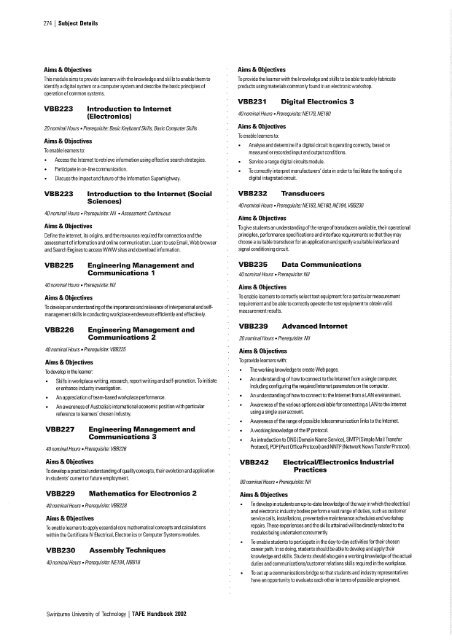2002 Swinburne TAFE Handbook - Swinburne University of ...
2002 Swinburne TAFE Handbook - Swinburne University of ...
2002 Swinburne TAFE Handbook - Swinburne University of ...
You also want an ePaper? Increase the reach of your titles
YUMPU automatically turns print PDFs into web optimized ePapers that Google loves.
274 I Subject Details<br />
Aims & Objectives<br />
This module aims to provide learners with the knowledge and skills to enable them to<br />
identify a digital system or a computer system and describe the basic principles <strong>of</strong><br />
operation <strong>of</strong> common systems.<br />
VBB223<br />
Introduction to Internet<br />
(Electronics)<br />
20 nominal Hours· Prerequisite: Basic Keyboard Skills, Basic Computer Skills<br />
Aims & Objectives<br />
To enable learners to:<br />
Access the Internetto retrieve information using effective search strategies.<br />
Participate in on-line communication.<br />
Discuss the impact and future <strong>of</strong> the Information Superhighway.<br />
VBB223<br />
Introduction to the Internet (Social<br />
Sciences)<br />
40 nominal Hours· Prerequisite: Nil • Assessment: Continuous<br />
Aims & Objectives<br />
Define the internet, its origins, and the resources required for connection and the<br />
assessrnent <strong>of</strong> information and online comrnunication. Learn to use Email, Web browser<br />
and Search Engines to access WWWsitesand download inforrnation.<br />
VBB225<br />
40 nominal Hours· Prerequisite: Nil<br />
Aims & Objectives<br />
Engineering Management and<br />
Communications 1<br />
To develop an understanding <strong>of</strong>the importance and relevance <strong>of</strong> interpersonal and selfmanagement<br />
skills in conducting workplace endeavours efficiently and effectively.<br />
VBB226<br />
40 nominal Hours. Prerequisite: VBB225<br />
Aims & Objectives<br />
To develop in the learner:<br />
Engineering Management and<br />
Communications 2<br />
Skills in workplace writing, research, report writing and self-promotion. To initiate<br />
or enhance industry investigation.<br />
An appreciation <strong>of</strong>team-based workplace perforrnance.<br />
An awareness <strong>of</strong> Australia's international economic position with particular<br />
reference to learners' chosen industry.<br />
VBB227<br />
40 nominal Hours· Prerequisite: VBB226<br />
Aims & Objectives<br />
Engineering Management and<br />
Communications 3<br />
To develop a practical understanding <strong>of</strong> quality concepts, their evolution and application<br />
in students' current or future employment.<br />
VBB229 Mathematics for Electronics 2<br />
40 nominal Hours. Prerequisite: VBB228<br />
Aims & Objectives<br />
To enable learners to apply essential core mathematical concepts and calculations<br />
within the Certificate IV Electrical, Electronics or Computer Systems modules.<br />
VBB230<br />
Assembly Techniques<br />
40 nominal Hours. Prerequisite: NE784, NBB78<br />
Aims & Objectives<br />
To provide the learner with the knowledge and skills to be able to safelyfabricate<br />
products using materials commonly found in an electronic workshop.<br />
VBB231 Digital Electronics 3<br />
40 nominal Hours· Prerequisite: NE779, NE780<br />
Aims & Objectives<br />
To enable learners to:<br />
Analyse and determine if a digital circuit is operating correctly, based on<br />
measured or recorded input and output conditions.<br />
Service a range digital circuits module.<br />
To correctly interpret manufacturers' data in orderto facilitate the testing <strong>of</strong> a<br />
digital integrated circuit.<br />
VBB232<br />
Transducers<br />
40 nominal Hours· Prerequisite: NE783, NE780, NE784, VBB230<br />
Aims & Objectives<br />
To give students an understanding <strong>of</strong> the range <strong>of</strong>transducers available, their operational<br />
principles, performance specifications and interface requirernents so that they may<br />
choose a suitable transducer for an application and specify a suitable interface and<br />
signal conditioning circuit.<br />
VBB235<br />
40 nominal Hours· Prerequisite: Nil<br />
Aims & Objectives<br />
Data Communications<br />
To enable learners to correctly select test equipment for a particular measurement<br />
requirement and be able to correctly operate the test equipment to obtain valid<br />
measurement results.<br />
VBB239<br />
20 nominal Hours· Prerequisite: Nil<br />
Aims & Objectives<br />
To provide learners with:<br />
Advanced Internet<br />
The working knowledge to create Web pages.<br />
An understanding <strong>of</strong> howto connect to the Internet from a single computer,<br />
including configuring the required Internet parameters on the computer.<br />
An understanding <strong>of</strong> howto connectto the Internetfrom a LAN environment.<br />
Awareness <strong>of</strong> the various options available for connecting a LAN to the Internet<br />
using a single user account.<br />
Awareness <strong>of</strong> the range <strong>of</strong> possible telecommunication links to the Internet.<br />
A working knowledge <strong>of</strong>the IP protocol.<br />
An introduction to DNS (Domain Name Service), SMTP (Simple Mail Transfer<br />
Protocol), POP (Post Office Protocol) and NNTP (Network News Transfer Protocol).<br />
VBB242<br />
80 nominal Hours. Prerequisite: Nil<br />
Aims & Objectives<br />
ElectricallElectronics Industrial<br />
Practices<br />
To develop in students an up-to-date knowledge <strong>of</strong>the way in which the electrical<br />
and electronic industry bodies perform a vast range <strong>of</strong> duties, such as customer<br />
service calls, installations, preventative maintenance schedules and workshop<br />
repairs. These experiences and the skills attained will be directly related to the<br />
modules being undertaken concurrently.<br />
To enable students to participate in the day-to-day activities fortheir chosen<br />
career path. In so doing, students should be able to develop and apply their<br />
knowledge and skills. Students should also gain a working knowledge <strong>of</strong>the actual<br />
duties and communications/customer relations skills required in the workplace.<br />
To set up a communications bridge so that students and industry representatives<br />
have an opportunity to evaluate each other in terms <strong>of</strong> possible employment.<br />
<strong>Swinburne</strong> <strong>University</strong> <strong>of</strong> Technology I <strong>TAFE</strong> <strong>Handbook</strong> <strong>2002</strong>
















